Turkish Police Attack Kurds Protesting Closure of School
When Turkey’s ruling party AKP announced its “democratic package” that among other things included reforms meant to address Kurdish calls for greater rights, some people expressed hope in this promise while others, especially Kurds, remained skeptical. AKP and its supporters promoted the reform package as a great step towards strengthening the already existent progressive democracy. AKP’s leader Erdogan unveiled the reform package with the following words: “Cowards cannot erect victory monuments. Those who are afraid of change, reforms and advanced standards cannot proceed even one step forward.”
As details of the reform package was made known, it was met with harsh criticism and dismissed as being merely superficial adjustments that did not meet the Kurdish people’s demands. Among one of the new reforms was the offer of providing Kurdish language education but this only applied to private schools and not public schools; a consequence of the Turkish constitution, which states that Turkish is the only official language in Turkey.
Not long ago I read an article by M. Şerif Derince, a Kurdish academic, called A break or continuity? Turkey’s politics of Kurdish language in the new millennium which began by describing an incident that took place in a Turkish court in 2011: During a court case against Kurdish politicians and activist, the judge told the clerk to write: ”It is understood that the defendant spoke in an unknown language.”
The ban on the Kurdish language in Turkey has had detrimental consequences for the millions of Kurds forced to live under a law restricting and banning their identity. Vahap Çoşkun, M Şerif Derince and Nesrin Uçarlar described some of these effects in their report “Scar of Tongue” where one Kurdish child said he had to use sign language to communicate with his friends because they were not allowed to speak their language while a girl said: “This time I began to feel more Kurdish. Because I began to express this more frequently in secondary school, they called me ‘peshmerga.’ In high school, they nicknamed me terrorist.”
It is no wonder that the Kurds now have taken it upon themselves to open three private schools that offer mother tongue education. The opening of the schools in Cizre, Amed and Gever took place this week as Kurdish students are showing support to a call by several Kurdish organisations and political parties to boycott Turkish state schools in protest of lack of education in mother tongue by not showing up for classes.
The Bêrîvan primary school in Cizre began first day of school with a ceremony attended by thousands of people who came to listen to co-mayor of Cizre, Leyla Imret:
At last we have our own schools. Our children will receive education in their mother tongue. Kurdish children do not have to receive education in a language they don’t know. We will do all we can to support this school. May it be auspicious for all our people.
At one school in a district of Amed, named after Ferzad Kemangar, a Kurdish school teacher who was executed by the state of Iran, Turkish police had turned up.
Firat News Agency wrote that the Turkish police had arrived with “armoured vehicles and water cannon at around 09.30, entering the garden of the school. Friction between the police and the parents of the students broke out. The attempts of the police to arrest people who prevented them from entering the school increased the tension.”
Tension has escalated tonight after the Public Prosecutor in Amed earlier today initiated an investigation of the Ferzad Kemangar school, calling the opening of the school “opening an unpermitted educational institution” and “committing crime on behalf of an illegal organisation.” The people staged sit-in’s and denounced the legitimacy of the closure with one pro-Kurdish MP saying: “We do not recognize your seal. Mother tongue is a right we have attained resisting. We will also be building our schools in the same way.”
As the pictures from tonight show, police in Amed (Diyarbakir) are using excessive force against civilians protesting the closure of Kurdish schools under the typical pretext given by state authorities of links to an “illegal organisation”, most likely meaning the PKK.
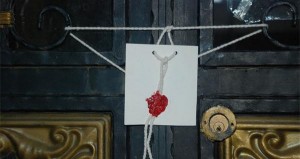
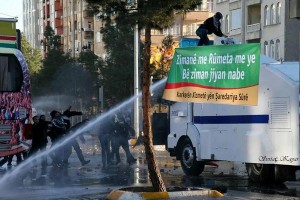
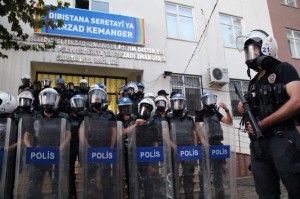
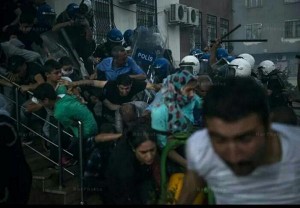
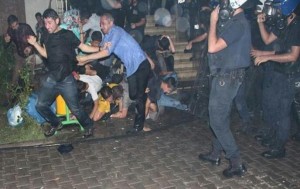
Comments are closed.